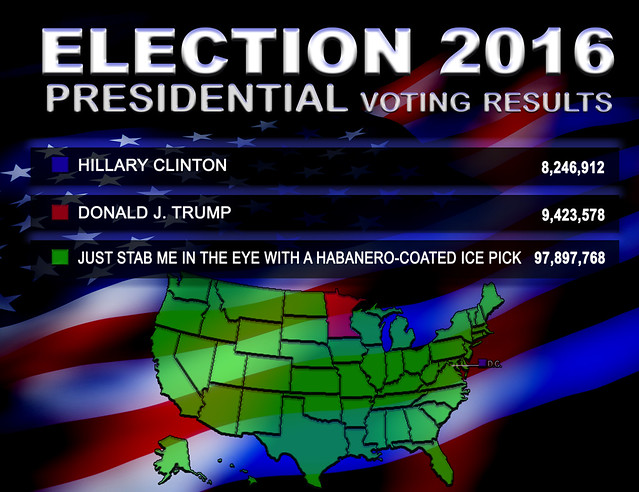Michael Tomasky's recent article in The Atlantic is a must-read for liberals in the U.S. who would like to win some elections in the future. He takes on the question of what we have learned from our recent high-profile losses that could help us moving forward. And while he finds some cause for optimism in the sense that we are now at least mounting some opposition (e.g., the anti-Trump resistance movement), he warns us about one thing we've mostly refused to address:
But there’s one thing a lot of elite liberals haven’t gotten around to dealing with yet: They haven’t made their peace with middle America. Which is a pretty big deal, given that middle America is extremely large, and encompasses most of the country, and generally determines the outcomes of most presidential elections.I think this is an important point and not just because it is similar to one I made back in November. I believe that the negative attitudes some coastal liberals hold toward those of us who prefer to live in rural America has been an issue when it comes to the political fortunes of the Democratic Party. It can be difficult to support politicians who are perceived as looking down on you, mocking your values, and so on.
I need to go off on a brief tangent here and address the weakest point of Tomasky's article. I found his description of what it means to be "an elite liberal" rather puzzling.
I’m not religious. I have few Republican friends. I have deeply conflicted feelings about patriotism. I would never consider living anywhere other than a major city, or at the very least a liberal university town where the odds are slim that I would end up next door to an actual racist.I'm not sure whether I'd count as an "elite liberal" in his mind. I'm not religious (obviously), and I would be inclined to describe myself as more hostile than conflicted on patriotism. On the other hand, I have more Republican friends than Democratic friends. Moreover, I do not think this is solely a function of where I live because it has been true for me everywhere I've lived (including multiple states along the West Coast). But where one lives is relevant here too because I have zero interest in living in a major city and have never decided where to live based on my anticipated proximity to racists. So would he consider me "an elite liberal" or not? I have no idea.
Setting that aside, I agree with Tomasky's thesis about many liberals living in major cities along the coasts being suspicious or even disdainful of middle America. I also think he's correct to point out that our quest for answers about why we lost so badly as deteriorated into "little more than an ideological standoff, a kind of purity test." And I think he's right that the racism vs. economics debate has now become counterproductive. We seem to have reached the predictable point where we're now demonizing people who think whichever one of these we consider less important to be the more important of the two.
Where do we go from here? Tomasky encourages liberals to recognize, "There are plenty of non-deplorables out there." I think that's the easy part. I've encountered relatively few liberals who still cannot bring themselves to do this (though some can certainly be found on social media). He also urges us to view them as potential allies, and this seems to be where too few liberals are willing to go. The inclination to see everyone who fails whatever purity test we're using at the moment as the enemy is still too strong. As a result, we are depriving ourselves of the opportunity to grow our numbers.
Tomasky concludes with the following:
I would go so far as to say that this chasm between elite liberals and middle America is liberalism’s biggest problem. It’s how we isolate ourselves. It’s one of the reasons a lot of middle Americans didn’t vote for Hillary. And bridging the gulf is on us, not them. It requires that we accept certain realities. A person can still be “on the team” even if they think the minimum wage should be raised only to $10, or don’t consider the placement of the crèche on the courthouse square for two weeks in December a constitutional crisis, or haven’t yet figured out how they feel about transgender bathrooms. If we don’t find a way to welcome them, they’ll go to the other side. That isn’t how majorities are built. Unfortunately, it’s how elections are lost.In other words, we are going to need to learn to accept those who fail our purity tests. This does not mean we must abandon our values; it means that we need to come to terms with certain political realities and learn to work with people who do not agree with us 100% of the time.
